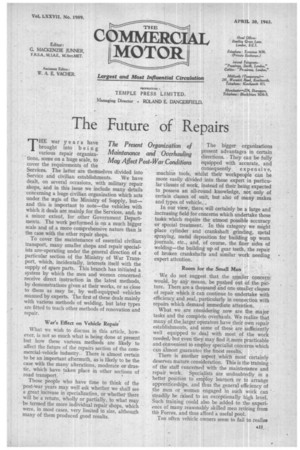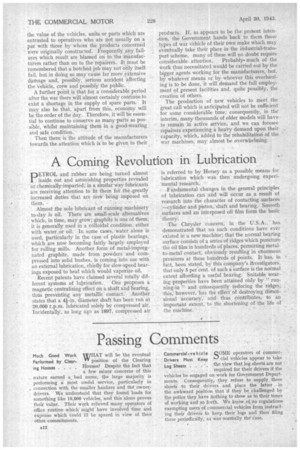The Future of Repairs
Page 13

Page 14

If you've noticed an error in this article please click here to report it so we can fix it.
THE war years have brought into being various repair organizations, some on a huge scale, to cover the requirements of the Services. The latter are themselves divided into Service and civilian establishments. We have dealt, on several occasions, with military repair shops, and in this issue we include many details concerning a huge civilian organization which acts under the mgis of the Ministry of Supply, but— and this is important to note—the vehicles with which it deals are mainly, for the Services, and to a minor extent, for other Government Departments. The 'work performed is on a much bigger scale and of a more comprehensive nature than is the case with the other repair shops.
To cover the maintenance of essential civilian transport, many smaller shops and repair specialists are operating under the general direction of a particular section of the Ministry of War Transport, which, incidentally, interests itself with the supply of spare parts. This branch has initiated a system by which the men and women concerned. receive direct instruction in the latest methods, by demonstrations given at their works, or as close to .them as may be, by well-equipped vehicles manned by experts. The first of these deals mainly with various methods of welding, but later types are fitted to teach other methods of renovation and repair.
War's Effect on Vehicle Repair.
What we wish to discuss in this article, however, is not so much what is being done at present but how these various methods are likely to affect the future of the repairs section of the cornmercial-vehicie industry.. There is almost certain to be an important aftermath, as is likely to be the case with the many alterations, moderate or drastic, which have taken place in other sections of road transport.
Those people who have time to think of the 'post-war years may well ask whether we shall see a great increase in specialization, or whether there will be a return, wholly or partially, to what may be termed the more individual repair shops, which were, in most cases, very limited in size, although many of them produced good results. The Present Organization of The bigger organizations Maintenance and 'Overhauling directions. They can be fully May Affect Post-War Conditions equipped with accurate, and consequently expensive, machine tools, whilst their workpeople can be more easily divided into those expert in particular classes of work, instead of their being expected to possess an all-round knowledge, not only of certain classes of unit, but also of many makes and types of vehicle.,.
In our view, there. will certainly be a large and increasing field for concerns which undertake those tasks which require the utmost possible accuracy or special treatment. In this category we might place cylinder and crankshaft grinding, metal spraying, metal deposition for building up worn journals, etc., and, of course, the finer sides of welding—the building up of gear teeth, the repair of broken crankshafts and similar work needing expert attention. .• Room for the Small Man We do not suggest that the smaller concern. would, by any means, be pushed out of the picture. There are a thousand and one smaller classes of repair which it can continue to undertake with efficiency, and zeal, particularly in connection with repairs which demand immediate attention.
What we are considering now are the major tasks and the complete overhauls. We realize that many of the larger operators have their own repair establishments, and some of these are sufficiently well equipped to deal with most of the work needed, but even they may find it more practicable and convenient to employ specialist concerns which can almost guarantee the finest results.
There is another aspect whiCh most certainly deserves mature consideration. This is the training of the staff concerned with the maintenance and repair work. Specialists are undoubtedly in a better position to employ learners or to arrange apprenticeships, and thus the general efficiency of the men or women engaged in such work can steadily be raised to an exceptionally high level. Such training could also be added to the experience of many reasonably skilled men retiring from th'e Forces, and thus afford a useful pool.
Too often vehicle owners seem to fail to realize 411. the value of the vehicles, units or parts which are entrusted to operatives who are not usually on a par with those by whom the products concerned were originally cc:instructed: Frequently any failures which result are blamed on to the manufacturers rather than on to the repairers. It must be remembered that a &itched job may not only itself fail, but in doing so may cause far more extensive damage and, possibly, serious accident affecting the Vehicle, crew and possibly the public.
A further point is that for a considerable period after the war there will almost certainly continue to exist a shortage in the supply of spare parts. It may also be that, apart from this, economy will be the order of the day. Therefore, it will be essential to continue to conserve as many parts as possible, whilst maintaining them in a good-Wearing and safe condition.
Then there is the attitude of the manufacturers towards the attention which is to be given to their products. If, as appears to be thepreent inten--lion, the Government hands back to them those types of war vehicle of their own make which may eventually take their place in the industrial-transport scheme, many of these will no doubt require 'considerable attention. Probablymuch of the Work thus necessitated would be carried out by the bigger agents working or the manufacturers, but by whatever means or bywhoever this overhauling is to be done, it will demand the full employment of .present facilities and, quite possibly, the creation of others. .
The production of new vehicles to meet the great call which is anticipated will nbt be sufficient for some considerable time; consequently, in the interim, many thousands of older models will have. to remain in active service, and we can foresee repairers experiencing a heavy demand upon their capacity, which, added to the rehabilitation of the war machines, may almost be overwhelming.




















































